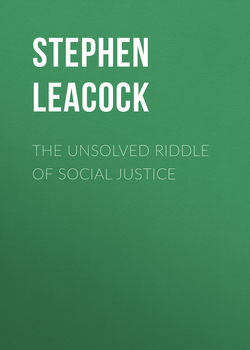The Unsolved Riddle of Social Justice

Реклама. ООО «ЛитРес», ИНН: 7719571260.
Оглавление
Stephen Leacock. The Unsolved Riddle of Social Justice
I.—The Troubled Outlook of the Present Hour
II.—Life, Liberty and the Pursuit of Happiness
III.—The Failures and Fallacies of Natural Liberty
IV.—Work and Wages
V.—The Land of Dreams: The Utopia of the Socialist
VI.—How Mr. Bellamy Looked Backward
VII.—What Is Possible and What Is Not
Отрывок из книги
"ALL men," wrote Thomas Jefferson in framing the Declaration of Independence, "have an inalienable right to life, liberty and the pursuit of happiness." The words are more than a felicitous phrase. They express even more than the creed of a nation. They embody in themselves the uppermost thought of the era that was dawning when they were written. They stand for the same view of society which, in that very year of 1776, Adam Smith put before the world in his immortal "Wealth of Nations" as the "System of Natural Liberty." In this system mankind placed its hopes for over half a century and under it the industrial civilization of the age of machinery rose to the plenitude of its power.
In the preceding chapter an examination has been made of the purely mechanical side of the era of machine production. It has been shown that the age of machinery has been in a certain sense one of triumph, of the triumphant conquest of nature, but in another sense one of perplexing failure. The new forces controlled by mankind have been powerless as yet to remove want and destitution, hard work and social discontent. In the midst of accumulated wealth social justice seems as far away as ever.
.....
The chief exposition of the system is found in the work of the classical economists—Adam Smith and his followers of half a century—who created the modern science of political economy. Beginning as controversialists anxious to overset a particular system of trade regulation, they ended by becoming the exponents of a new social order. Modified and amended as their system is in its practical application, it still largely conditions our outlook to-day. It is to this system that we must turn.
The general outline of the classical theory of political economy is so clear and so simple that it can be presented within the briefest compass. It began with certain postulates, or assumptions, to a great extent unconscious, of the conditions to which it applied. It assumed the existence of the state and of contract. It took for granted the existence of individual property, in consumption goods, in capital goods, and, with a certain hesitation, in land. The last assumption was not perhaps without misgivings: Adam Smith was disposed to look askance at landlords as men who gathered where they had not sown. John Stuart Mill, as is well known, was more and more inclined, with advancing reflection, to question the sanctity of landed property as the basis of social institutions. But for the most part property, contract and the coercive state were fundamental assumptions with the classicists.
.....